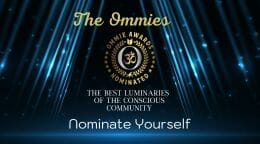Love Your Neighbor As Yourself

To Love your Neighbor as yourself is a fundamental cornerstone of many Faiths.
Learn to Love Your Neighbor
by Isha Judd
Certain principles are universal truths, and they appear in most religions. The golden rule “Love your neighbor as yourself” is an aspect of compassion, based on the principle that we recognize others as an aspect of ourselves. It is so universal that in 1993 it was included in the “Declaration of world ethics by the Parliament of the World’s Religions,” and signed by leaders of the main religions of the world.
But why is it so difficult for us to comply with this golden rule? Because we lack love for ourselves. The violence, discrimination, and repression that humanity “inflicts on others” is a reflection of the judgments and rejection we feel for ourselves. We are often our own worst enemies, judging ourselves with more intensity than anyone else can, repressing and punishing ourselves, and striving to behave differently than we naturally are.
This golden rule relates to the emphasis on service, which is shared by religions. Giving is the blissful extension of a realized heart because when we experience inner fulfillment, our greatest pleasure is to extend our bliss towards others. Charity, in many cultures, is perceived as self-denial; but well-understood charity “begins at home.” When we learn to accept and be kind and loving to ourselves, these qualities overflow into our environment, as an extension of our love and acceptance.
India, perhaps more than any other country, shows us that religions can coexist peacefully. With its unique cultural diversity, it hosts followers of almost all the religions of the world. During a recent visit to New Delhi, I met Ezequiel Isaac Malekar, leader of the Jewish community in India, who told me that this is the only country in the world where Jews have never been persecuted, where there has never been anti-Semitism. India is a profoundly religious country, and this attitude of mutual respect shows that religions do not necessarily have to disagree. If we preach tolerance and love, peaceful coexistence should be a priority.
Hinduism is the predominant religion of India. I wonder if the acceptance of other forms of worship in that country is related to the fact that Hindus worship only one God, but in multiple ways. There are millions of “gods” in Hinduism, each representing a different aspect of God himself, so when foreigners arrived with new names for their gods, the Hindus accepted their beliefs without judgment.
So how do we love ourselves? By embracing difference, by embracing the new. By choosing the things that help us evolve, not the things that make us feel comfortable because it’s not important for us to be comfortable. Friction is what makes us develop. Friction moves the stress and creates more consciousness. Friction is the best friend of evolution. Passivity doesn’t evolve. It just continues doing the same thing. How does a person feel when they are not evolving? Bored, they start creating conflict and drama so they can feel alive, but a person that is challenging themselves, that is moving forward, that is focused in giving doesn’t have time for dramas, doesn’t have time to take from others, doesn’t have time not be happy and moving forward. This is a passionate person.
Animals never sit around feeling sorry for themselves. They always make the best of what they have. Nature is like that, and yet we have humans with everything, and they beg for love, we have all the love we need, but we keep asking for more. What is it to love ourselves? To evolve, to have new experiences, to love all aspects of ourselves unconditionally, to embrace life and enjoy every moment.
Just as the spring cannot do anything but give of itself, the realized heart cannot avoid sharing its discovery with all humanity. We must discover a love for ourselves and then, giving with joy arises as a natural consequence of this.
Only then can you love your neighbor as yourself!
You will also enjoy How Do You Create and Live With True Love? and Facing the Dark of Heartlessness
About the Author
Isha Judd is an Australian humanitarian, spiritual teacher based in Latin America, author of “Love Has Wings” and “Why Walk When You Can Fly?”. Watch “Why Walk When You Can Fly?” on iTunes. Her website is www.ishajudd.com.
 PIN IT
PIN ITOMTimes Magazine is one of the leading on-line content providers of positivity, wellness and personal empowerment. OMTimes Magazine - Co-Creating a More Conscious Reality










